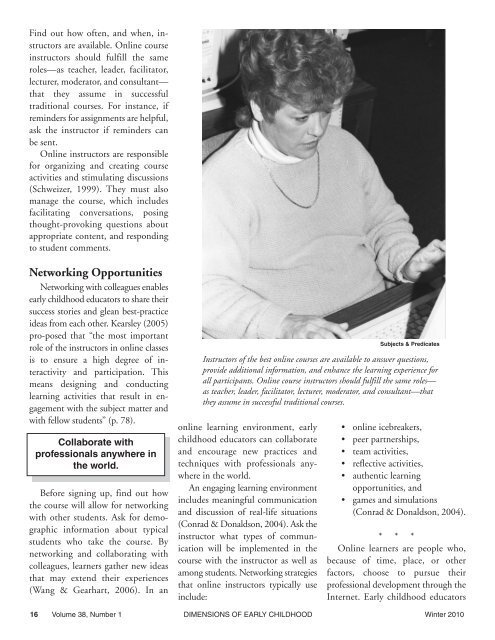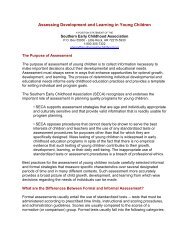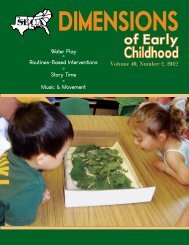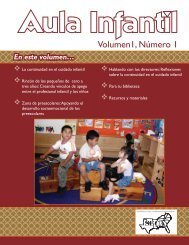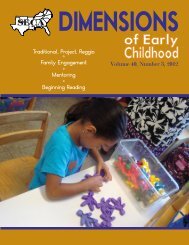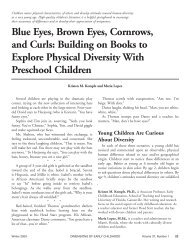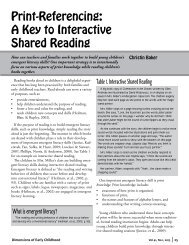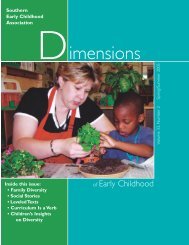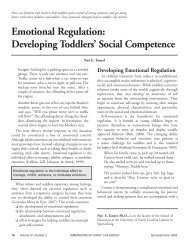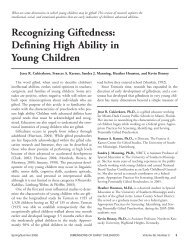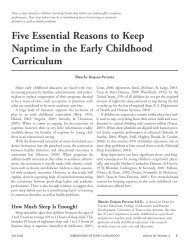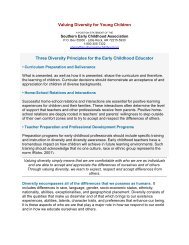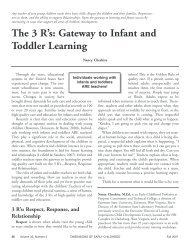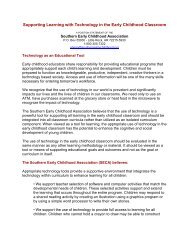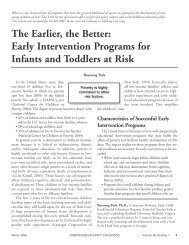90223 Dimensions Winter 10:Layout 1 - Southern Early Childhood ...
90223 Dimensions Winter 10:Layout 1 - Southern Early Childhood ...
90223 Dimensions Winter 10:Layout 1 - Southern Early Childhood ...
Create successful ePaper yourself
Turn your PDF publications into a flip-book with our unique Google optimized e-Paper software.
Find out how often, and when, instructors<br />
are available. Online course<br />
instructors should fulfill the same<br />
roles—as teacher, leader, facilitator,<br />
lecturer, moderator, and consultant—<br />
that they assume in successful<br />
traditional courses. For instance, if<br />
reminders for assignments are helpful,<br />
ask the instructor if reminders can<br />
be sent.<br />
Online instructors are responsible<br />
for organizing and creating course<br />
activities and stimulating discussions<br />
(Schweizer, 1999). They must also<br />
manage the course, which includes<br />
facilitating conversations, posing<br />
thought-provoking questions about<br />
appropriate content, and responding<br />
to student comments.<br />
Networking Opportunities<br />
Networking with colleagues enables<br />
early childhood educators to share their<br />
success stories and glean best-practice<br />
ideas from each other. Kearsley (2005)<br />
pro-posed that “the most important<br />
role of the instructors in online classes<br />
is to ensure a high degree of interactivity<br />
and participation. This<br />
means designing and conducting<br />
learning activities that result in engagement<br />
with the subject matter and<br />
with fellow students” (p. 78).<br />
Collaborate with<br />
professionals anywhere in<br />
the world.<br />
Before signing up, find out how<br />
the course will allow for networking<br />
with other students. Ask for demographic<br />
information about typical<br />
students who take the course. By<br />
networking and collaborating with<br />
colleagues, learners gather new ideas<br />
that may extend their experiences<br />
(Wang & Gearhart, 2006). In an<br />
online learning environment, early<br />
childhood educators can collaborate<br />
and encourage new practices and<br />
techniques with professionals anywhere<br />
in the world.<br />
An engaging learning environment<br />
includes meaningful communication<br />
and discussion of real-life situations<br />
(Conrad & Donaldson, 2004). Ask the<br />
instructor what types of communication<br />
will be implemented in the<br />
course with the instructor as well as<br />
among students. Networking strategies<br />
that online instructors typically use<br />
include:<br />
Subjects & Predicates<br />
Instructors of the best online courses are available to answer questions,<br />
provide additional information, and enhance the learning experience for<br />
all participants. Online course instructors should fulfill the same roles—<br />
as teacher, leader, facilitator, lecturer, moderator, and consultant—that<br />
they assume in successful traditional courses.<br />
• online icebreakers,<br />
• peer partnerships,<br />
• team activities,<br />
• reflective activities,<br />
• authentic learning<br />
opportunities, and<br />
• games and simulations<br />
(Conrad & Donaldson, 2004).<br />
* * *<br />
Online learners are people who,<br />
because of time, place, or other<br />
factors, choose to pursue their<br />
professional development through the<br />
Internet. <strong>Early</strong> childhood educators<br />
16 Volume 38, Number 1 DIMENSIONS OF EARLY CHILDHOOD <strong>Winter</strong> 20<strong>10</strong>


